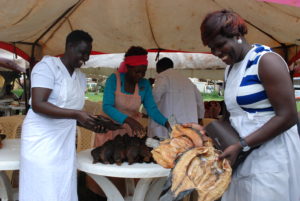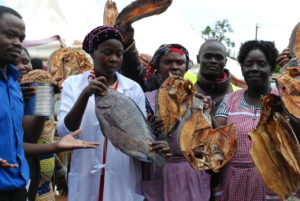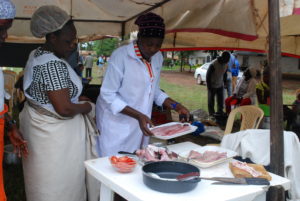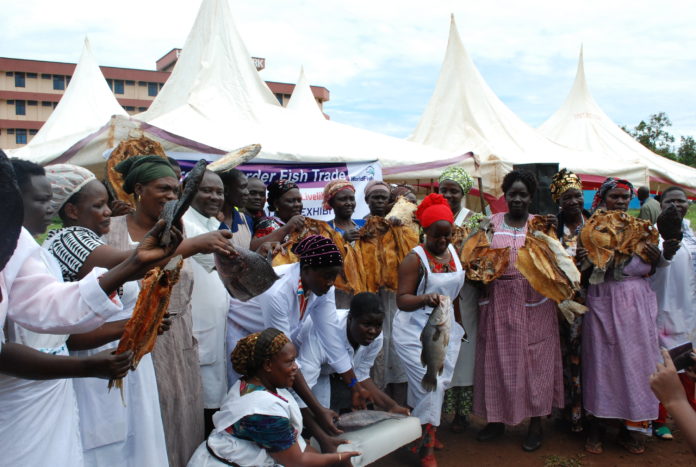By Okong’o Oduya
Fish smuggling through porous borders and uninspected passenger buses from Uganda to Kenya has been cited to be the major challenge that is now facing fish traders in Busia Kenya.
According to Lenah Oduori a fish trader in Busia market says “Our counterparts from Uganda are crossing in Kenya through passenger buses with uninspected fish to Nairobi accessing direct Kenyan shaking their market.”
She is asking that fish from Uganda into the country must be inspected by fishery department in Kenya, supplied to the Kenyan fish traders before they are packed before they can proceed to the Kenyan market.
“Business here is not as the way it used to be in the previous years. Our counterparts from Uganda are supposed to be supplying the fish to us, we inspect them before we transport them to our market but instead they cross the border with fish in passenger buses accessing directly to our markets at cheaper price leaving us helpless,” she said

In an interview with Talk Africa in Busia during the fish trade exhibition day, the fish traders blamed their Ugandan counterparts for invading their business territory rendering them irrelevant.
“When we sell our fish to our clients at a higher price, and Ugandans are supplying the fish at a lower price we are perceived as conmen and women,” she said
Selina Auma another fish trader in Busia blames both Ugandan and Kenyan authorities for allowing fish smugglers penetrate Kenyan market with the undersize fish saturating the fish market in the country making it difficult for them to sell their products.
“Fish are packed and transported in passenger buses contrary to what we do. They pack these fish either in buses from Kampala or buses that leaves Busia and Malaba in the evening to Nairobi. We transport our fish refrigerated tracks to maintain hygiene and standard but those that are transported in buses their hygiene is compromised,” she noted
“We don’t know why Ugandan fish traders are allowed to use passenger buses to transport fish in Kenya yet we are not allowed to do so in Uganda. Ugandan authorities prohibit us crossing beyond the borders of Uganda in search of fish but our Kenyan securities are allowing our Ugandan counterparts to use public vehicles to transport fresh fish to Nairobi,” she added

In what is believed to be damaging their reputation as Kenyan fish traders, fish packed in public service vehicles not only that they are undersized they are transported together with other alleged illegal cargo that ends up compromising the quality and the hygiene of fish.
Margaret Okaka another fish trader at Busia states that every fish proceeding to market in Kenya should be inspected by various entities such as fisheries and health departments to certain their quality as well as promoting fair business competition among the fish traders.
“There is no way we will be in fair business with our fellows from Uganda as the East Africa community policies states when one side is facing challenges while another side is reaping the benefit,” said Okaka
Monicah Ochieng also the fish merchant is calling upon the Ugandan government to allow them to access direct fish market in Uganda instead of them being restricted from going beyond the border.
Mercy Kawala a student at Makerere University and the author of the economic analysis of fish trade along the border report, that was conducted for the 2 years in Busia town relays lack of knowledge among the Ugandan fish traders, high tax on the fish that is crossed in Kenya, manufacturing, and use of illegal fishing gears leads to the smuggling of fish in the country through unauthorized routes.
The report that was facilitated by world fish Zambia, Kawala says ksh500 that is taxed on a tone of fish that is crossed in the country is expensive for a fish trader with many tones and the only way to evade that is to use illegal ways to access Kenyan market.
She accuses the Ugandan government of permitting the company’s manufacturing poor fishing gears to be used and as a result of the gears casting undersize fish and at the end, the use of illegal routes to enter in the country.
“There are a lot of things that are hindering smooth running of the fish business along Kenya and Uganda border. Lack of education, high tax, long procedures that need to be adhered to when clearing the cargo at the border and use of improper fishing gears are among the few causes of fish smuggling along the border,” Kalawa said
 “I blame our governments in all these. If indeed they are serious they want to deal with illegal fishing and smuggling across the border they need to iron out some of these problems. The government needs to put the produced poor fishing gears from reaching the fishermen,” she added you don’t expect fish trader with undersized fish to use authorized routes to access the market because he/she knows very well it is wrong,” she explained.
“I blame our governments in all these. If indeed they are serious they want to deal with illegal fishing and smuggling across the border they need to iron out some of these problems. The government needs to put the produced poor fishing gears from reaching the fishermen,” she added you don’t expect fish trader with undersized fish to use authorized routes to access the market because he/she knows very well it is wrong,” she explained.
Addressing the media in Busia the program manager at fish trade program in world fish Zambia Mr. Idriss Alli Nassah lack of enough knowledge is the major reason why fish traders are facing challenges along the Kenya Uganda border in Busia.
He urged the policymakers between the countries sharing the border to come together and identify these challenges and how to solve them as a way of reducing the barriers in the sector.
According to Idriss, the report will help the stakeholders to come up with plans that will help traders along border identify new markets outside their locality.
“The traders here don’t know they can access more markets outside Busia. What we are doing will open them to international markets across the globe. In many cases we trade amongst ourselves, we need to know we can get new markets for our products and this will be materialized through such forums,” he said
However the fish department Busia County noted that they have no knowledge of fish smuggling in Kenya from Uganda using passenger vehicles. Fish director in the county Mr. Timothy Odende says his department will investigate to verify the allegation raised by the traders.
“We are yet to receive any complaint from the traders but if at all there is, we will look into it and conduct an investigation to get the truth of the matter,” said Odende














